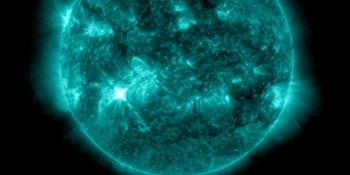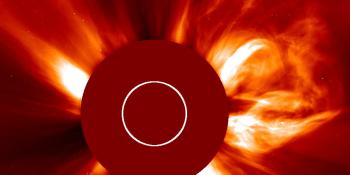Visualizzazione archivio di martedì, 29 luglio AM
Rapporto attività solare
Ogni brillamento solare menzionato nel rapporto ha un fattore di scala, applicato dal Centro di Predizione Meteorologica Spaziale (SWPC). A causa del fattore di scala del SWPC, i brillamenti solari sono segnalati come ridotti del 42%, rispetto ai dati di qualità scientifica. Il fattore di scala è stato rimosso dai nostri dati archiviati sui brillamenti solari, per riflettere le unità fisiche reali.
Rapporto dell'Attività Geofisica Solare 2003 Jul 29 2200 UTCPreparati dal SWPC della NOAA© ed elaborati da SpaceWeatherLive.com
Rapporto Congiunto USAF/NOAA dell'Attività Solare e Geofisica
SDF Numero 210 Emesso alle 2200Z il Jul 29 2003IA. Analisi delle Regioni Solari Attive e Attività dalle 2100Z-28 alle 2100Z-29 Solar activity increased to moderate levels. Region
421 (S08E54) produced an impulsive M1.3/1f flare at 29/0139Z. There
appears to be a weak gamma magnetic structure in the trailing
portion of the spot cluster and there was little apparent change to
the penumbral structure during the period. Region 422 (N14W54)
steadied in growth since yesterday and was limited to minor B and
C-class flares today. No new regions were numbered today.
IB. Previsione dell'Attività Solare
Solar activity is expected to be at
low levels. Region 421 has the potential to produce an isolated
M-class flare
IIA. Sommario dell'Attività Geofisica dalle 2100Z-28 alle 2100Z-29
The geomagnetic field was at predominantly active to minor storm
levels. A period of major storm conditions were observed at the
Boulder magnetometer between 29/0300 and 0600Z. The elevated
activity is in response to a recurrent coronal hole high speed solar
wind stream that has been ranging between 750 and 800 km/s
throughout the day. The greater than 2 MeV electron fluxes at
geosynchronous orbit reached high levels today.
IIB. Previsione dell'Attività Geofisica
The geomagnetic field is
expected to be at predominantly active levels through the first two
days of the forecast period due to recurrent coronal hole high speed
stream effects. Occasional minor storm conditions are expected and
isolated major storm episodes may also be possible due to the
elevated solar wind speeds. Day three should see a decrease to
unsettled to active conditions with isolated minor storm intervals
possible at night side locations.
III. Probabilità dell'Evento dalle Jul del 30 alle Aug del 01
| Classe M | 35% | 35% | 35% |
| Classe X | 10% | 10% | 10% |
| Protone | 01% | 01% | 01% |
| PCAF | green | ||
IV. Flusso di 10.7 cm di Penticton
Osservato 29 Jul 100 Previsto 30 Jul-01 Aug 100/105/105 Media di 90 Giorni 29 Jul 125
V. Indici Geomagnetici A
Osservato Afr/Ap 28 Jul 015/017 Stimato Afr/Ap 29 Jul 025/030 Previsto Afr/Ap 30 Jul-01 Aug 020/025-020/020-015/020
VI. Probabilità dell'Attività Geomagnetica dal 30 Jul al 01 Aug
| A. Latitudini Medie | |||
|---|---|---|---|
| Attivo | 35% | 35% | 25% |
| Tempesta minore | 20% | 20% | 10% |
| Tempesta maggiore-grave | 10% | 10% | 05% |
| B. Latitudini Alte | |||
|---|---|---|---|
| Attivo | 45% | 45% | 40% |
| Tempesta minore | 30% | 25% | 25% |
| Tempesta maggiore-grave | 15% | 10% | 10% |
Tutti gli orari in UTC
<< Vai alla pagina della panoramica giornaliera
Ultime notizie
Ultimi messaggi dal forum
Our Sun can possibly produce a Superflare roughly every 100 years? 622024/12/23 AR13932 M8.9 & M4.1 associated CMEs 54AR 3938 28IP cameras for sky surveillance 21Deep flare net 9
Altri argomentiSupporta SpaceWeatherLive.com!
Molte persone vengono su SpaceWeatherLive per seguire l'attività del Sole o sapere se ci sia la possibilità di vedere l'aurora, ma a maggior traffico corrispondono costi maggiori. Considerate una donazione se vi piace SpaceWeatherLive così che possiamo mantenere online il sito web!

Notizie sul meteo spaziale
| Ultimo brillamento X | 2024/12/08 | X2.2 |
| Ultimo brillamento M | 2024/12/27 | M3.3 |
| Ultima tempesta geomagnetica | 2024/12/17 | Kp5+ (G1) |
| Giorni senza macchie | |
|---|---|
| Ultimo giorno senza macchie | 2022/06/08 |
| Media mensile Numero di Macchie Solari | |
|---|---|
| novembre 2024 | 152.5 -13.9 |
| dicembre 2024 | 122.8 -29.7 |
| Last 30 days | 123.5 -27.8 |


